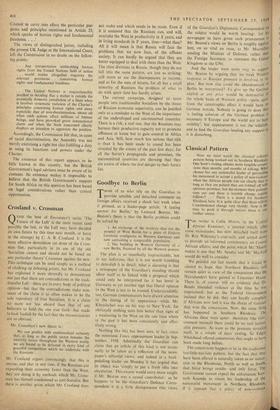Crosland v. Crossman
QurrE the best of Encounter's series 'The . Future of the Left' is the most recent (and possibly the last, as the Left may have decided its own future by this time next month, or burst in the attempt) by C. A. R. Crosland. It is the most effective demolition yet done of the Cross- man. line, particularly in its use of the old 'Socialism cannot and should not be based on any particular theory' Crossman against the new. This technique can be used simply as a method of chalking up debating points; but Mr. Crosland has exploited it more shrewdly to demonstrate not just that there are contradictions in the tradi- tionalist Left--there are in every body of political opinion—but that the contradictions make non- sense of the claim it so often makes to be the sole repository of true Socialism. It is a claim no more nor less absurd than that of any believers to hold the one true faith- but made to look foolish by the fact that the inconsistencies are so obvious.
Mr. Crossman's new thesis is: We can predict with mathematical certainty that, as long as the public sector remains the minority sector throughout the Western world. we are bound to be defeated in every kind of peaceful competition which we undertake with the Russians.
Mr. Crosland argues convincingly that this is untrue, and that in any case, if the Russians are expanding their economy faster than the West, they are doing it by methods which Mr. Cross- man has himself condemned as anti-Socialist. But there is another point which Mr. Crosland does not make and which needs to be made. Even if it is assumed that the Russians can, and will, overtake the West in productivity in X years, and in living standards in Y years, time—what then? All it will mean is that Russia will face the problems that we now face, of the affluent society. It can hardly be argued that they are better equipped to deal with them than the West. The class divisions in Russia, though they do not fall into the same pattern, are just as striking; still more so arc the discrepancies in income; and as for the uses of leisure, for all but a small minority of Russians the problem of what to do with spare time has hardly arisen.
The current campaign, designed to scare people into traditionalist Socialism by the threat of Russian economic superiority, can be justified only as a reminder to the West of the importance of the undeveloped and uncommitted countries. There is a risk, a real one, that the Russians may harness their productive capacity not to promote affluence at home but to gain control in Africa and Asia. Still, how much less serious that risk is than it has been made to sound has been revealed by the events of the past few days; for all the Soviet's propaganda and promises, the uncommitted countries are showing that they are aware of where the real danger to their future lies.














































 Previous page
Previous page